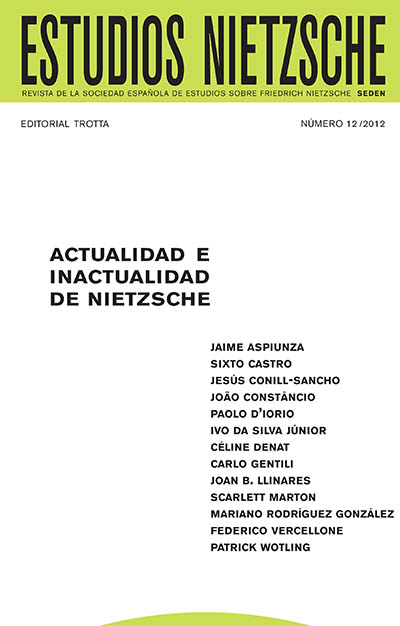The Role of Metaphor in Nietzsche’s Approach to Political Issues
DOI:
https://doi.org/10.24310/EstudiosNIETen.vi12.10556Keywords:
metaphor, nationalism, music, European unityAbstract
By analyzing the chapter «Peoples and Fatherlands» (§§ 240-256) in Beyond Good and Evil, we intend to point out the way by which Nietzsche accomplishes his critique to nationalism, as opposed to European unity, assuming as a reference German music, particularly the Wagnerian one, which, in this case, embodies a worldview based on an ideal of formation (Bildung) practically inexistent in the philosopher’s contemporary Germany. In this way we aim to emphasize the fact that politics cannot be taken as a metaphor to describe «states of soul», but rather that it should be understood in its effective dimension.
Downloads
Metrics
References
Arantes, P. Ressentimento da dialética, Sáo Paulo: Paz e Terra, 1996.
Nietzsche, F., Obras Completas, I-IV (OC ). Director ed. Diego Sánchez Meca. Madrid: Tecnos, 2011-2016
Nietzsche, F., Correspondencia I-VI. (CO). Director ed. Luis E. de Santiago Guervós. Madrid : Trotta, 2005- 2012.
Nietzsche, F., Fragmentos Póstumos I-IV (FP). Director ed. Diego Sánchez Meca. Madrid: Tecnos, 2006-2010.
Sánchez Meca, D., En torno al superhombre. Nietzsche y la crisis de la modernidad, Barcelona: Anthropos, 1989.
Santiago Guervós, L. E de, Arte y poder, Aproximación a la estética de Nietzsche, Madrid: Trotta, 2004.
Downloads
Published
How to Cite
Issue
Section
License
As of issue 21 (2021) this journal is published only in open access (diamond route).
From that number 21, like the previous numbers published in NIETZSCHE STUDIES, they are subject to the Creative Commons Acknowledgment-NoComercia-ShareIgual 4.0 license, the full text of which can be consulted at <http://creativecommons.org/licenses/by-nc-sa/4.0 >
It is the responsibility of the authors to obtain the necessary permissions of the images that are subject to copyright.
This work is licensed under a Creative Commons Attribution-NonCommercial-ShareAlike 4.0 International License.
Copyright generates two different rights: moral rights and patrimonial rights that EJFB recognizes and respects. Moral rights are those relating to the recognition of the authorship. They are rights of a personal nature that are perpetual, inalienable, unseizable and imprescriptible as consequence of the indivisible union of the author and his/her work.
Patrimonial rights are those that can be derived from the reproduction, distribution, adaptation or communication of the work, among others.







11.png)
